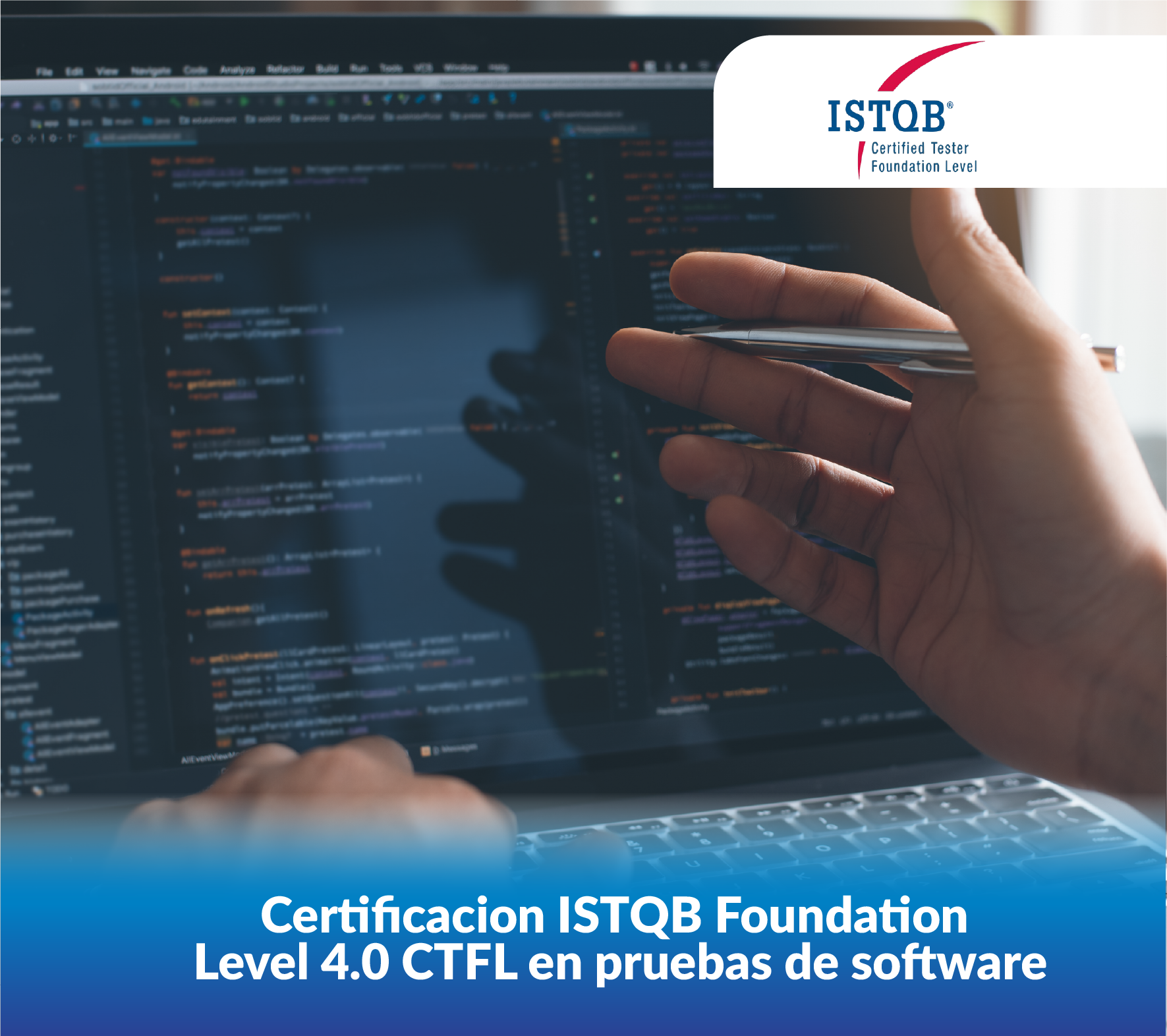
The ISTQB Foundation Level 4.0 (CTFL) course is designed to provide complete software testing, from basic concepts to its application in the development cycle.
This program prepares participants to obtain international certification:
ISTQB Certified Tester Foundation Level 4.0 (CTFL).
Students will learn about test strategies, test case design, defect management and automation tools, ensuring the effective application of tests in software projects.
Under the practical Learning Method approach, participants will work on laboratories, practical workshops and/or real projects, ensuring the effective application of knowledge acquired in business environments.
At the end of the course, participants will be able to:
To participate in this training, attendees must meet the following requirements:
This requirement ensures that participants can focus on the practical application of software tests without initial technical difficulties.
| ISTQB FOUNTION LEVEL 4.0 CTFL CERTIFICATION IN SOFTWARE TESTS | Applies |
|---|---|
| ISTQB FOUNTION LEVEL 4.0 CTFL CERTIFICATION IN SOFTWARE TESTS | 27 hours |
The learning methodology, regardless of the modality (in-person or remote), is based on the development of workshops or labs that lead to the construction of a project, emulating real activities in a company.
The instructor (live), a professional with extensive experience in work environments related to the topics covered, acts as a workshop leader, guiding students' practice through knowledge transfer processes, applying the concepts of the proposed syllabus to the project.
The methodology seeks that the student does not memorize, but rather understands the concepts and how they are applied in a work environment.
As a result of this work, at the end of the training the student will have gained real experience, will be prepared for work and to pass an interview, a technical test, and/or achieve higher scores on international certification exams.
You do not need to pay to pre-enroll. By pre-enrolling, you reserve a spot in the group for this course or program. Our team will contact you to complete your enrollment.
Pre-enroll nowMake your payment quickly, safely and reliably
- For bank transfer payments, request the details by email
capacita@aulamatriz.edu.co.
- If you wish to finance your payment through our credit options
(Sufi, Cooperativa Unimos or Fincomercio), click on the following link:
Ver opciones de crédito.
The ISTQB Foundation Level 4.0 (CTFL) course is designed to provide complete software testing, from basic concepts to its application in the development cycle.
This program prepares participants to obtain international certification:
ISTQB Certified Tester Foundation Level 4.0 (CTFL).
Students will learn about test strategies, test case design, defect management and automation tools, ensuring the effective application of tests in software projects.
Under the practical Learning Method approach, participants will work on laboratories, practical workshops and/or real projects, ensuring the effective application of knowledge acquired in business environments.
At the end of the course, participants will be able to:
To participate in this training, attendees must meet the following requirements:
This requirement ensures that participants can focus on the practical application of software tests without initial technical difficulties.
| ISTQB FOUNTION LEVEL 4.0 CTFL CERTIFICATION IN SOFTWARE TESTS | Applies |
|---|---|
| ISTQB FOUNTION LEVEL 4.0 CTFL CERTIFICATION IN SOFTWARE TESTS | 27 hours |
The learning methodology, regardless of the modality (in-person or remote), is based on the development of workshops or labs that lead to the construction of a project, emulating real activities in a company.
The instructor(live), a professional with extensive experience in work environments related to the topics covered, acts as a workshop leader, guiding students' practice through knowledge transfer processes, applying the concepts of the proposed syllabus to the project.
La metodología persigue que el estudiante "does not memorize", but rather "understands" the concepts and how they are applied in a work environment."
As a result of this work, at the end of the training the student will have gained real experience, will be prepared for work and to pass an interview, a technical test, and/or achieve higher scores on international certification exams.
You do not need to pay to pre-enroll. By pre-enrolling, you reserve a spot in the group for this course or program. Our team will contact you to complete your enrollment.
Make your payment quickly, safely and reliably
- For bank transfer payments, request the details by email
capacita@aulamatriz.edu.co.
- If you wish to finance your payment through our credit options
(Sufi, Cooperativa Unimos or Fincomercio), click on the following link:
Ver opciones de crédito.